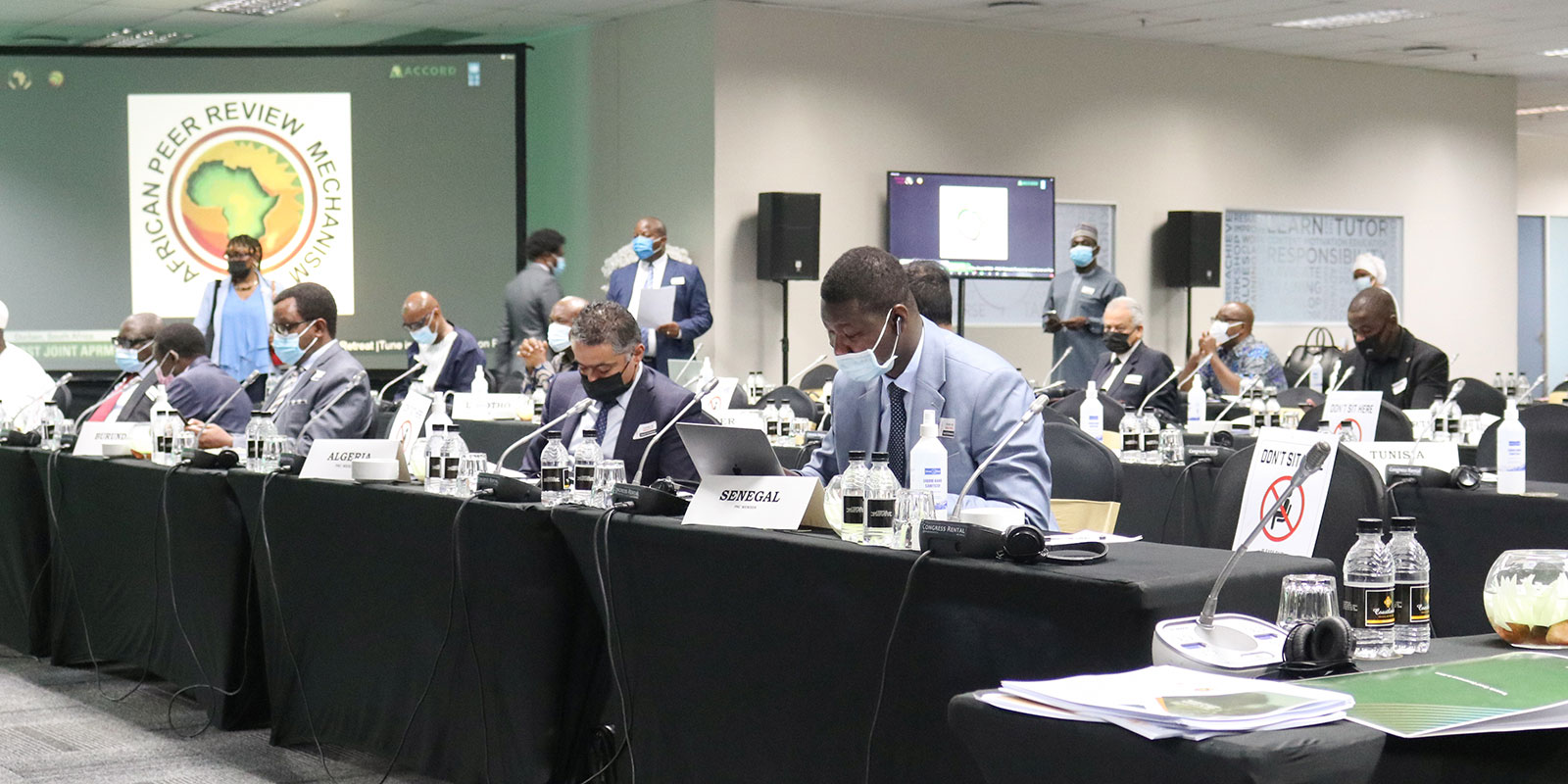From 19th to 21st December 2021, members of the African Union (AU) Peace and Security Council (PSC), the APR Panel of Eminent Persons, Africa Governance Platform members, the Panel of the Wise secretariat, Femwise, Youth Peace Envoy, experts and partners such as ACCORD, United Nations Development Programme (UNDP) and GIZ gathered in Durban, South Africa, for a specific occasion: the Inaugural Joint Retreat between the African Peer Review Mechanism (APRM) and the PSC, organised pursuant to the decision of the PSC taken at its 914th Meeting held on 5 March 2020 (PSC/PR/COMM.(CMXIV)). The retreat was organised in Durban, a landmark for peace and security on the Continent since it is the birthplace of the PSC Protocol, adopted 20 years ago.
Having taken note of the eThekwini Conclusions and its enclosed decisions and recommendations, the APRM and the PSC have the responsibility to ensure that the eThekwini Conclusions do not end up becoming just another policy in the archives.
Tweet
Nonetheless, one may wonder if the Joint APRM-PSC retreat was yet just another meeting of the AU and whether there was any significant and tangible outcome. Rest assured as the answer is—Yes. Firstly, the primary objective of this Inaugural Joint Retreat was to adopt the Conclusions, now referred to as the eThekwini Conclusions, focusing on the harmonisation of Early Warning mechanisms for conflict prevention and Peace and Security initiatives on the Continent. This is in line with the PSC Protocol that emphasises the relationship between the PSC and African Union organs such as the APRM; but also underscores the vital role of civil society organisations, inclusive of youth and women, in conflict prevention, democracy, rule of law, human rights, good governance for peace, security and stability in Africa.
It is critical to underline the need to harmonise peace and security efforts on the Continent. Indeed, despite the AU defining specific mandates for specific entities, it is necessary to further breakdown objectives and streamline deliverables amongst peace and security actors in practice. This is to prevent duplication or lack of coherence in the implementation of mandates. For example, as much as the Department of Political Affairs, Peace and Security of the AU is the primary owner of the peace and security and conflict prevention agenda on the Continent and in that regard, has developed tools such as the Continental Structural Conflict Prevention Framework to monitor the implementation of this agenda; the APRM has also developed an Early Warning Framework for conflict prevention. Hence, the Joint APRM-PSC Retreat allowed stakeholders to formulate the way forward for the PSC, APRM and other stakeholders within the Conclusion, which will help maximise resources and consolidate efforts in the pursuit of peace and security in Africa.
Secondly, the joint APRM-PSC Retreat served as an avenue for the AU to draw closer to the realisation of i) the Solemn Declaration on the 50th Anniversary of the OAU/AU (Assembly/AU/Decl.3(XXI)), adopted by the AU Assembly of Heads of State and Government (Assembly); ii) Agenda 2063, ‘The Africa We Want’ Aspirations 3: An Africa of good governance, democracy, respect for human rights, justice and the rule of law, and Aspiration 4: A peaceful and secure Africa; iii) Continental Structural Conflict Prevention Framework (CSCPF) of 2015: the Country Structural Vulnerability and Resilience Assessments (CSVRAs) and Country Structural Vulnerability Mitigation Strategies (CSVMS); iv) AU Master Roadmap on Practical Steps in Silencing the Guns by the Year 2030.
Lastly, the Joint APRM-PSC Retreat has to be diarised as an annual AU event as it was designed as a platform to share experiences and best practices in governance, peace and security emanating from review processes such as country reviews or early warning reviews for conflict prevention. Also, the Joint APRM-PSC Retreat provides an opportunity to take stock of achievements and challenges, such as governance deficits in the implementation of the Peace and Security Agenda; with the expectation of developing inclusive policies and joint strategies to offset governance shortcomings impacting the livelihood, peace and safety of African citizens.
Having taken note of the eThekwini Conclusions and its enclosed decisions and recommendations, the APRM and the PSC have the responsibility to ensure that the eThekwini Conclusions do not end up becoming just another policy in the archives. Therefore, the APRM has taken the initiative to develop a roadmap involving activities requiring coordinated effort for implementation with the PSC, AU organs, RECs, Regional Mechanisms, and partners, notably ACCORD, GIZ, and UNDP. One activity that seeks to put some recommendations from the Conclusions into motion is the Africa Governance Report 2023, which requires the participation of member states, AGA Platform members, APSA, civil society, Femwise, the AU Youth envoy and Think Tanks.
As the AU commemorates Africa Day in the month of May and in consideration of the expressed concern over the resurgence of unconstitutional changes of government at the Inaugural Joint APRM-PSC retreat as captured in the eThekwini Conclusions and at the 35th Ordinary Session of the Assembly held in February, 2022 through Decision, Assembly/AU/Dec. 815(XXXV); the APRM is conducting a campaign to sensitise stakeholders on unconstitutional changes of government by submitting a proposal to the PSC and other AU policy organs suggesting that the theme of the third Africa Governance Report (ARG), the AGR-2023, be on Unconstitutional Changes of Government. The same proposal will be submitted to its peers for adoption at the Extraordinary Summit on Terrorism and Unconstitutional Changes of Government in Malabo by the Chairperson of the APR Forum, H.E Julius Maada Bio, President of the Republic of Sierra Leone.
Professor Eddy Maloka is the Chief Executive Officer of the APRM.


